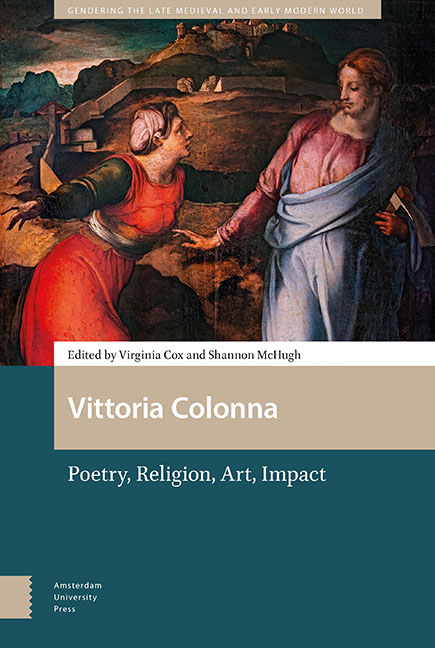Book contents
- Frontmatter
- Dedication
- Contents
- List of Illustrations
- Acknowledgements
- Introduction: The Twenty-First Century Vittoria Colonna
- Part 1 Literary and Spiritual Sociability
- Part 2 Widowhood
- Part 3 Poetry
- Part 4 Art
- Part 5 Readership
- Part 6 Impact
- Volume Bibliography
- Index of Citations of Colonna’s Letters and Verse
- Thematic Index
4 - Outdoing Colonna: Widowhood Poetry in the Late Cinquecento
Published online by Cambridge University Press: 16 December 2021
- Frontmatter
- Dedication
- Contents
- List of Illustrations
- Acknowledgements
- Introduction: The Twenty-First Century Vittoria Colonna
- Part 1 Literary and Spiritual Sociability
- Part 2 Widowhood
- Part 3 Poetry
- Part 4 Art
- Part 5 Readership
- Part 6 Impact
- Volume Bibliography
- Index of Citations of Colonna’s Letters and Verse
- Thematic Index
Summary
Abstract
This chapter examines the influence of Colonna's widowed poetry on three women writers of the second half of the sixteenth century: Laura Battiferri, Chiara Matraini and Francesca Turina. I demonstrate how Colonna's famous proemial sonnet, Scrivo sol per sfogar l’interna doglia, and her widowed persona more broadly, is reflected in the works of these later poets. This study also significantly elongates the timeline of Colonna's influence, proving just how late her rime vedovili were being imitated and explored: deep into the Counter-Reformation, Turina and Matraini were still engaging directly with her work as a way to legitimate their own authorial voices. The chapter's evidence also troubles longstanding scholarly understandings about how ‘anxiety of influence’ has worked for women writers.
Keywords: widowhood poetry, Counter-Reformation, anxiety of influence, madrigals
To the reader or scholar versed in Vittoria Colonna's remarkable life story, her poetry and her high-profile friendships, the proemial sonnet of her rime amorose is nothing less than a classic.
Scrivo sol per sfogar l’interna doglia
ch’al cor mandar le luci al mondo sole,
e non per giunger lume al mio bel Sole
al chiaro spirto, a l’onorata spoglia.
Giusta cagion a lamentar m’invoglia;
ch’io scemi la sua gloria assai mi dole;
per altra voce e più sagge parole
convien ch’a Morte il gran nome si toglia.
La pura fe’, l’ardor, l’intensa pena
mi scusi appo ciascun, che ‘l grave pianto
è tal che tempo né ragion l’affrena.
Amaro lagrimar, non dolce canto,
foschi sospiri e non voce serena,
di stil no, ma di duol mi danno il vanto.
I write solely to salve the suffering that those bright eyes, peerless in this world, caused my heart, and not to add luster to my lovely Sun, to his radiant spirit and honoured remains. A just cause leads me to lament, and it sorely pains me that I may detract from his glory; his great name deserves to be rescued from death by a loftier voice and wiser words. May my pure faith, my ardour, my intense grief excuse me, for my mourning is such that neither reason nor time can restrain it. Bitter weeping, not sweet song; dark sighs, not a serene voice: my verse boasts not of style but of woe.
- Type
- Chapter
- Information
- Vittoria ColonnaPoetry, Religion, Art, Impact, pp. 95 - 114Publisher: Amsterdam University PressPrint publication year: 2021

